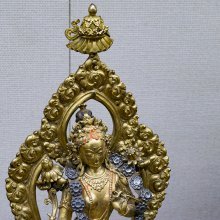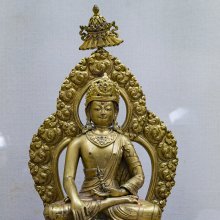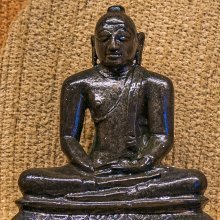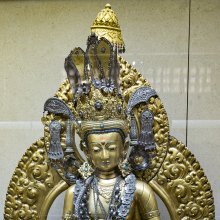Vada, Vāda: 30 definitions
Introduction:
Vada means something in Buddhism, Pali, Hinduism, Sanskrit, Jainism, Prakrit, the history of ancient India, Marathi, Hindi, biology. If you want to know the exact meaning, history, etymology or English translation of this term then check out the descriptions on this page. Add your comment or reference to a book if you want to contribute to this summary article.
Alternative spellings of this word include Vaad.
Images (photo gallery)
(+6 more images available)
In Hinduism
Purana and Itihasa (epic history)
Source: archive.org: Shiva Purana - English TranslationVāda (वाद) refers to the “pleasing sound” (of the tabor), according to the Śivapurāṇa 2.3.27 (“Description of the fraudulent words of the Brahmacārin”).—Accordingly, as Śiva (in guise of a Brahmacārin) said to Pārvatī: “[...] Sandal paste is applied on your body, while the ashes of the funeral pyre on that of Śiva. Where your silken garment and where the elephant-hide of Śiva. Where the divine ornaments and where the serpents of Śiva? Where the deities that move about and where Śiva, fond of goblins and their oblations? Where the pleasing sound of his tabor [i.e., mṛdaṅga-vāda]? Where His peculiar drum called Damaru? Where the set of fine drums and the inauspicious sound of his horn? [...]”.
Source: Cologne Digital Sanskrit Dictionaries: The Purana IndexVāda (वाद).—An Amitābha god.*
- * Brahmāṇḍa-purāṇa II. 36. 54.

The Purana (पुराण, purāṇas) refers to Sanskrit literature preserving ancient India’s vast cultural history, including historical legends, religious ceremonies, various arts and sciences. The eighteen mahapuranas total over 400,000 shlokas (metrical couplets) and date to at least several centuries BCE.
Nyaya (school of philosophy)
Source: Wisdom Library: NyāyaVāda (वाद) refers to “discussion”. It is one of the sixteen categories of discussion (padārtha) according to the doctrine of the Nyāya-sūtras by Akṣapāda. The sixteen padārthas represent a method of intellectual analysis and categorize everything that is knowable and nameable.
Source: Shodhganga: A study of Nyāya-vaiśeṣika categoriesVāda (वाद, “discussion”) refers to the tenth of the sixteen padārthas (“categories”) in the first chapter of Gautama’s Nyāyasūtra (2nd century CE). Vāda is one type of discussion which is conducted with the help of pramāṇas and tarka. This discussion establishes a new theory. In this discussion, both the parties–the exponent (vādi) and the opponent (prativādi) try to establish their own opinion and refuse the opposite. This discussion is called vāda. Gautama says that vāda (discussion) means the establishment of one from the two opposite points, discussing it by five members which is protected by the right knowledge.

Nyaya (न्याय, nyaya) refers to a school of Hindu philosophy (astika), drawing its subject-matter from the Upanishads. The Nyaya philosophy is known for its theories on logic, methodology and epistemology, however, it is closely related with Vaisheshika in terms of metaphysics.
Ayurveda (science of life)
Source: gurumukhi.ru: Ayurveda glossary of termsVāda (वाद):—[vādaḥ] Debate ; argument in a hostile spirit of challenge with the aid of authoritative knowledge .

Āyurveda (आयुर्वेद, ayurveda) is a branch of Indian science dealing with medicine, herbalism, taxology, anatomy, surgery, alchemy and related topics. Traditional practice of Āyurveda in ancient India dates back to at least the first millenium BC. Literature is commonly written in Sanskrit using various poetic metres.
Shaktism (Shakta philosophy)
Source: Google Books: ManthanabhairavatantramVaḍa (वड) refers to a “wild flowers”, according to the Śrīmatottara-tantra, an expansion of the Kubjikāmatatantra: the earliest popular and most authoritative Tantra of the Kubjikā cult.—Accordingly, “(The adept) should meditate on the goddess Parāparā in the middle of the triangle. [...] Divine, she holds a noose and a goad and makes gestures of bestowing boons and fearlessness. A garland of wild flowers [i.e., vaḍa-mālā] is tied to her head and she wears a necklace of letters. She is rich with the beauty of all her limbs and is adorned with all the ornaments. She possesses the Five Insignias and the three sacred seats. Having visualized the goddess in this way in the middle of the Cavity Brahmā, one should repeat the mantra there encapsulated with the Five Praṇavas”.

Shakta (शाक्त, śākta) or Shaktism (śāktism) represents a tradition of Hinduism where the Goddess (Devi) is revered and worshipped. Shakta literature includes a range of scriptures, including various Agamas and Tantras, although its roots may be traced back to the Vedas.
Vaishnavism (Vaishava dharma)
Source: Pure Bhakti: Bhajana-rahasya - 2nd EditionVāda (वाद) refers to “path” (i.e., the Descending or Ascending path), according to the commentary on the Bhajana-rahasya verse 2.14.—Accordingly, [...] Knowledge endowed with a sense of one’s relationship with Śrī Kṛṣṇa appears through the process of bhakti by the means of hearing and chanting. The ācāryas have ascertained that the mood of service appears by hearing from authorities. The impersonalists do not follow this path of hearing, which is the descending path (avaroha-vāda). Rather, they endeavour to take shelter of the doctrine of the ascending path (āroha-vāda). Their attempts are compared to trying to reach the sky by climbing on falling raindrops. When the living entity is absorbed in service to the object of bhajana and not in any other object, pure bhakti and proper renunciation (yukta-vairāgya) will arise

Vaishnava (वैष्णव, vaiṣṇava) or vaishnavism (vaiṣṇavism) represents a tradition of Hinduism worshipping Vishnu as the supreme Lord. Similar to the Shaktism and Shaivism traditions, Vaishnavism also developed as an individual movement, famous for its exposition of the dashavatara (‘ten avatars of Vishnu’).
Shaivism (Shaiva philosophy)
Source: Brill: Śaivism and the Tantric Traditions (philosophy)Vāda (वाद) refers to a “debate”, according to Svacchandatantroddyota, vol. VI, 98 (alluding to Nyāyasūtra 1.2.1).—Accordingly, “Debate (vāda), which comprehends both the thesis and the antithesis, [and] which is a discourse of [people] who are free of bias (vītarāga-kathā-rūpa) [...]”.
Note: On vāda as a vītarāgakathā see also e.g. Nyāyamañjarī, vol. I, 18 or Nyāyabhūṣaṇa, 328; cf. Tantrālokaviveka on Tantrāloka 13.126, vol. VIII, 90. So as far as I understand the Īśvarapratyabhijñāvivṛtivimarśinī passage, Abhinavagupta simply means here that by raising himself (svayam) this objection to his own thesis, Utpaladeva is showing to his opponent that he is an unbiased interlocutor.

Shaiva (शैव, śaiva) or Shaivism (śaivism) represents a tradition of Hinduism worshiping Shiva as the supreme being. Closely related to Shaktism, Shaiva literature includes a range of scriptures, including Tantras, while the root of this tradition may be traced back to the ancient Vedas.
In Buddhism
Theravada (major branch of Buddhism)
Source: Dhamma Dana: Pali English GlossaryM (Doctrine, philosophy). Conviction, ideal.
Theravāda is a major branch of Buddhism having the the Pali canon (tipitaka) as their canonical literature, which includes the vinaya-pitaka (monastic rules), the sutta-pitaka (Buddhist sermons) and the abhidhamma-pitaka (philosophy and psychology).
Buddhist philosophy
Source: Google Books: A History of Indian Logic (Buddhist Philosophy)Vāda (वाद) refers to a “debate”, according to Upāyakauśalyahṛdaya, an ancient work on the art of debate composed by Bodhisattva Nāgārjuna.—In Chinese this work is called Fan-pien-sin-lun. It was translated into Chinese by Ci-cia-ye and Than-yao in A.D. 472.—Seeing that the Vaiśeṣika and other systems were obscure in their terminology, Nāgārjuna, it is reported, undertook to write this book to give a clear exposition of the art of debate. The book is divided into four chapters styled respectively as (I) an elucidation of debate (vāda-visadīkaraṇa), (II) an explanation of the points of defeat (nigrahasthāna), (III) an explanation of the truths (tattva-vyākhyāna), and (IV) the analogue or far-fetched analogy (jāti).
-
In Jainism
General definition (in Jainism)
Source: archive.org: Jaina YogaVaḍa (वड) in Prakrit or Vaṭa in Sanskrit refers to the banyan (Ficus bengalensis), the shoots (aṅkura) of which are classifed as ananta-kāya, or “plants that are inhabited by an infinite number of living organisms”, and therefore are abhakṣya (forbidden to consume) according to Nemicandra (in his Pravacana-sāroddhāra v245-246). Those plants which are classified as ananta-kāyas (e.g., vaḍa) seem to be chosen because of certain morphological peculiarities such as the possession of bulbs or rhizomes orthe habit of periodically shedding their leaves; and in general theyare characterized by possibilities of vegetative reproduction.

Jainism is an Indian religion of Dharma whose doctrine revolves around harmlessness (ahimsa) towards every living being. The two major branches (Digambara and Svetambara) of Jainism stimulate self-control (or, shramana, ‘self-reliance’) and spiritual development through a path of peace for the soul to progess to the ultimate goal.
India history and geography
Source: archive.org: Geography in Ancient Indian inscriptionsVāḍa is a word denoting a ‘village’ or ‘hamlet’ and can be seen as a synonym for grāma, often used in inscriptions.—Terms such as vāḍa are in many cases, associated with the names of the villages so as to become the ending part of the different place-names. Inscriptions throw light on the location of the villages in different ways. Firstly, they communicate us an idea about the country, the division and the sub-division to which these villages belonged. Secondly, the inscriptions provide information regarding theboundaries of the donated villages.
Source: Cologne Digital Sanskrit Dictionaries: Indian Epigraphical GlossaryVāḍa.—(CITD), Telugu-Kannaḍa; a street, a range of houses. (EI 11), a ward. (IA 7), also vāḍi; often suffixed to geographical names. (CII 4), name of a tax. Note: vāḍa is defined in the “Indian epigraphical glossary” as it can be found on ancient inscriptions commonly written in Sanskrit, Prakrit or Dravidian languages.
--- OR ---
Vāḍa or Vāḍā.—(IE 8-4), corrupt forms of pāṭaka, ‘part of a village’; in soem dialects, also ‘a village’; often suffixed to the names of localities. Note: vāḍa is defined in the “Indian epigraphical glossary” as it can be found on ancient inscriptions commonly written in Sanskrit, Prakrit or Dravidian languages.

The history of India traces the identification of countries, villages, towns and other regions of India, as well as mythology, zoology, royal dynasties, rulers, tribes, local festivities and traditions and regional languages. Ancient India enjoyed religious freedom and encourages the path of Dharma, a concept common to Buddhism, Hinduism, and Jainism.
Biology (plants and animals)
Source: Google Books: CRC World Dictionary (Regional names)Vada in India is the name of a plant defined with Ficus benghalensis in various botanical sources. This page contains potential references in Ayurveda, modern medicine, and other folk traditions or local practices It has the synonym Ficus cotoneaefolia Hort. ex Miq. (among others).
Example references for further research on medicinal uses or toxicity (see latin names for full list):
· Enumeratio plantarum (1805)
· Bot. Mat. Med. (1812)
· Plant Systematics and Evolution (1987)
· Species Plantarum
· Ann. Mus. Bot. Lugduno-Batavi (1867)
If you are looking for specific details regarding Vada, for example diet and recipes, health benefits, extract dosage, pregnancy safety, side effects, chemical composition, have a look at these references.

This sections includes definitions from the five kingdoms of living things: Animals, Plants, Fungi, Protists and Monera. It will include both the official binomial nomenclature (scientific names usually in Latin) as well as regional spellings and variants.
Languages of India and abroad
Pali-English dictionary
Source: BuddhaSasana: Concise Pali-English Dictionaryvāda : (m.) theory; saying; creed controversy.
Source: Sutta: The Pali Text Society's Pali-English DictionaryVada, (adj.) (-°) (fr. vad) speaking, in cpd. vaggu° speaking pleasantly Sn. 955 (cp. Nd1 446; SnA 571=sundaravada); suddhiṃ° of clean speech Sn. 910. (Page 599)
— or —
Vāda, (fr. vad: see vadati; Vedic vāda (not in RV!), in meaning of “theory, disputation” only in Class. Sk. ‹-› The relation of roots vac: vad is like E. speak: say; but vāda as t. t. has developed quite distinctly the specified meaning of an emphatic or formulated speech= assertion or doctrine) 1. speaking, speech, talk, nearly always —°, e.g. iti° hearsay, general talk M. I. 133; S. V, 73; A. II, 26; kumāraka° child-talk or childish talk, i.e. in the manner of talking to a child S. II, 218 sq.; cori° deceitful talk PvA. 89 (so read with v. l. for T. bheri°); dhammika° righteous speech A. V, 230; musā° telling lies, false speech A. I, 129; II, 141; IV, 401; PvA. 15. See under musā.—adj. (—°) speaking up for, proclaiming, advertising D. I, 174 (sīla°, paññā° etc.); Sn. 913 (nivissa° dogmatist); A. I, 287 (kamma°, kiriya°, viriya°).—vādaṃ bhindati to refute a speech, to make a view discrepant (cp. bhinna-vāda under 4!) SnA 45 (Māravādaṃ bh.).—2. what is said, reputation, attribute, characteristic Sn. 859 (but SnA 550=nindā-vacana); J. I, 2 (jāti° genealogy, cp. D. I, 137). See also cpd. °patha.—3. discussion, disputation, argument, controversy, dispute Sn. 390, 827 (also as adj. hīna°); DhA. III, 390= Vin. IV, 1; Mhvs 4, 42 (sutvā ubhinnaṃ vādaṃ).—4. doctrine, theory put forth, creed, belief, school, sect SnA 539 sq.; in cpds. : ācariya° traditional teaching Miln. 148; also “heterodoxy” Mhbv 96, cp. Dpvs. V, 30; uccheda° annihilistic doctrine Nd1 282: see under uccheda; thera° the tradition of the Theras, i.e. the orthodox doctrine or word of Gotama Buddha Mhvs 5, 2; 33, 97 sq.; Dpvs. V, 10, 14 (theravādo aggavādo ti vuccati), 51 (17 heretical sects, one orthodox, altogether 18 schools); dhuta° (adj.) expounding punctiliousness Vism. 81 (=aññe dhutaṅgena ovadati anusāsati). See under dhuta; bhinna° heretical sect (lit. discrepant talk or view) Dpvs. V, 39, 51 (opp. abhinnaka vāda); sassata° an eternalist Ps. I, 155.

Pali is the language of the Tipiṭaka, which is the sacred canon of Theravāda Buddhism and contains much of the Buddha’s speech. Closeley related to Sanskrit, both languages are used interchangeably between religions.
Marathi-English dictionary
Source: DDSA: The Molesworth Marathi and English Dictionaryvaḍa (वड).—m (vaṭa S) Indian Fig-tree, Ficus Indica. Pr. vaḍāsa ālīṃ vaḍaphaḷēṃ kāvaḷyāsa ālēṃ rūṃ (or rōga) Said of prosperity or good coming when the power of enjoyment is gone. vaḍācī sāla pimpaḷāvara lāvaṇēṃ, or vaḍācī sāla pimpaḷālā pimpaḷācī sāla vaḍālā lāvaṇēṃ To make the false true and the true false; to lie extravagant- ly: also to walk tortuously; to shift and veer about fraudulently. vaḍa pikaṇēṃ (The ripening of the vaḍa tree.) Expresses the opening up of employment and subsistence to multitudes.
--- OR ---
vaḍā (वडा).—m (S or vaṭaka S) A cake made of pulse ground, soaked, spiced, and fried. vaḍyācēṃ tēla vāṅgyāvara (kāḍhaṇēṃ &c.) Anger excited by one object poured forth upon another: also blame upon one for another's fault.
--- OR ---
vāḍa (वाड).—n R & W (Commonly vāḍhēṃ) The crop of a sugarcane.
--- OR ---
vāḍa (वाड).—f Room, vacancy, free or unfilled space: also leisure, free or unengaged time.
--- OR ---
vāḍa (वाड).—& vāḍaṇēṃ R and in poetry for vāḍha & vāḍhaṇēṃ.
--- OR ---
vāḍa (वाड).—a (Poetry.) Large, great, huge, immense, monstrous. Ex. haḷūhaḷū hyācēṃ puṇya jhālēṃ vāḍa || vāralēṃ hēṃ jhāḍa trimirācēṃ ||; also gaganāhuni vāḍa nāma āhē ||. 2 Vast, exceeding, extended, infinite &c.; as applied to brahma or īśvara. (Wrongly explained in jñānēśvarakōśa by the word ṭhēṅgaṇā.) Ex. jē ākā- śāhuni vāḍa avyaktāhi pailīkaḍē ||; also (in rāmavi- jaya) tyā rāmācēṃ nāma gōḍa || jyācī kathā tyāhuni vāḍa || jēṃ līlā aikatā purē kōḍa ||. 3 Mighty, marvelous, wonderful, transcendent, preternatural in power or in excellence generally. Applied with all the licentiousness of poetry. Ex. vipraśāpa parama vāḍa || mṛgarāja kēlā saraḍa ||.
--- OR ---
vāḍā (वाडा).—m (vāṭa or vāṭī S) A stately or large edifice, a mansion, a palace. Also in comp. as rāja- vāḍā A royal edifice; sarakāravāḍā Any large and public building. 2 A division of a town, a quarter, a ward. Also in comp. as dēūḷavāḍā, brāhmaṇa- vāḍā, gauḷīvāḍā, cāmbhāravāḍā, kumbhāravāḍā. 3 A division (separate portion) of a maujā or village. The vāḍā, as well as the kōṇḍa, paid revenue formerly, not to the sarakāra but to the maujēkhōta. 4 An enclosed space; a yard, a compound. 5 A pen or fold; as gurāñcā vāḍā, gauḷavāḍā or gavaḷīvāḍā, dhana- garavāḍā. The pen is whether an uncovered enclosure in a field or a hovel sheltering both beasts
--- OR ---
vāda (वाद).—m (S) Disputation, discussion, debate, argumentation. 2 Discourse, conversation, confabulation, oral conference. 3 Report, rumor, popular talk. Ex. tyā laḍhāīnta tyānēṃ taravāra māralī asā lōkānta vāda āhē. 4 A suit at law, a plaint.
--- OR ---
vāda (वाद).—f C (Usually vādī) A strap or leash (of a sandal &c.); a thong of leather.
--- OR ---
vāda (वाद).—m (vāta S) Numbness (of a limb or part). v yē.
--- OR ---
vādā (वादा).—m C A sort of murrain in cattle; the distemper or rot.
--- OR ---
vādā (वादा).—m The lash of a whip. 2 unc A large strap or thong of leather.
Source: DDSA: The Aryabhusan school dictionary, Marathi-Englishvāḍā (वाडा).—or-
--- OR ---
vaḍa (वड).—m Indian fig-tree, Ficus Indica. vaḍācī sāla pimpaḷālā va pimpaḷācī sāla vaḍālā lāvaṇēṃ, which means to make the false true and the true false.
--- OR ---
vaḍā (वडा).—m A cake made of pulse ground, soaked, spieed, and fried. vaḍyācēṃ tēla vāṅgyāvara Anger excited by one object poured forth upon another; blame upon one for another's fault.
--- OR ---
vāḍa (वाड).—a Large; vast; mighty. f Room.
--- OR ---
vāḍā (वाडा).—m A place. A pen or fold. A compound. A ward.
--- OR ---
vāda (वाद).—m Debate; discourse. Report. A plaint. f A thong of leather.
--- OR ---
vādā (वादा).—m-dēṃ n A sort of murrain in cattle.
Marathi is an Indo-European language having over 70 million native speakers people in (predominantly) Maharashtra India. Marathi, like many other Indo-Aryan languages, evolved from early forms of Prakrit, which itself is a subset of Sanskrit, one of the most ancient languages of the world.
Sanskrit dictionary
Source: DDSA: The practical Sanskrit-English dictionaryVaḍā (वडा).—
1) A kind of cake.
2) A small lump globule.
--- OR ---
Vada (वद).—a. Speaking, talking, speaking well.
--- OR ---
Vāḍa (वाड).—An enclosure; L. D. B.
Derivable forms: vāḍaḥ (वाडः).
--- OR ---
Vāda (वाद).—[vad-ghañ]
1) Talking, speaking.
2) Speech, words, talk; वेदवादररताः पार्थ नान्यदस्तीति वादिनः (vedavādararatāḥ pārtha nānyadastīti vādinaḥ) Bhagavadgītā (Bombay) 2.42; सामवादाः सकोपस्य तस्य प्रत्युत दीपकाः (sāmavādāḥ sakopasya tasya pratyuta dīpakāḥ) Śiśupālavadha 2.55; so कैतववादः (kaitavavādaḥ) Gītagovinda 8; सान्त्ववादः (sāntvavādaḥ) &c.
3) A statement, an assertion, allegation; अवाच्यवादांश्च बहून् वदिष्यन्ति तवाहिताः (avācyavādāṃśca bahūn vadiṣyanti tavāhitāḥ) Bhagavadgītā (Bombay) 2.36.
4) Narration, account; शाकुन्तलादीनितिहासवादान् (śākuntalādīnitihāsavādān) Mālatīmādhava (Bombay) 3.3.
5) Discussion, dispute, controversy; वादयुद्धप्रधानाश्च मध्यमा राजसी गतिः (vādayuddhapradhānāśca madhyamā rājasī gatiḥ) Manusmṛti 12.46; वादे वादे जायते तत्त्वबोधः (vāde vāde jāyate tattvabodhaḥ) Sūbhāṣ; सीमा° (sīmā°).
6) A reply.
7) An exposition, explanation; अध्यात्मविद्या विद्यानां वादः प्रवदतामहम् (adhyātmavidyā vidyānāṃ vādaḥ pravadatāmaham) Bhagavadgītā (Bombay) 1.32.
3) A demonstrated conclusion, theory, doctrine; इदानीं परमाणुकारण- वादं निराकरोति (idānīṃ paramāṇukāraṇa- vādaṃ nirākaroti) S. B. (and in diverse other places of the work); परिणामवाद (pariṇāmavāda) 'the theory of evolution'; so नास्तिक° (nāstika°).
9) Sounding, sound.
1) Report, rumour.
11) A plaint (in law).
12) Advice, counsel.
13) Agreement.
Derivable forms: vādaḥ (वादः).
Source: Cologne Digital Sanskrit Dictionaries: Edgerton Buddhist Hybrid Sanskrit DictionaryVaḍa (वड).—(m., = AMg. id., Sanskrit and Pali vaṭa), banyan: Kāraṇḍavvūha 8.3, in a list of flowers, -mahāmāndāra-vaḍāudumbara- puṣpa-.
--- OR ---
Vāḍa (वाड).—(-vāḍa), see s.v. maṇḍala-māḍa.
--- OR ---
Vāda (वाद).—m. (= Sanskrit), talk; in phrase kaḥ punar vādaḥ (not noted elsewhere, common in [Buddhist Hybrid Sanskrit]), not to speak of; to say nothing of; geschweige denn: Saddharmapuṇḍarīka 298.7 ff. (prose; after ṣaṣṭi-, line 6) kaḥ punar vādaḥ pañcāśad-, not to speak of (i.e. a still larger number with) fifty…, and so on with forty, thirty, etc.; (ya imaṃ…dharmaparyāyaṃ śrutvāvatared…) k° p° v° ya imam…śrāvayed vā- cayed…Saddharmapuṇḍarīka 337.4—5, i.e. how much more…; similarly Vajracchedikā 33.11; (kusīdo dārakas…cakṣuḥsaṃprekṣaṇām api na kṛtavān) k° p° v° utthāsyati…Avadāna-śataka i.16.6, not to speak of rising (much less would he rise; note future tense, tho referring to failure to act in the past); (srotaāpannasamu- dācāram api na samudācarati,) k° p° v° laukikān samu- dācārān samudācariṣyati (fut., as in prec.) Daśabhūmikasūtra 65.3; (yatrāgatir makara-°śuśumārādīnāṃ…, so mss.) k° p° v° manuṣyāṇām Divyāvadāna 105.28, where even makaras (etc.) cannot go, not to speak of men; (mahāphalaṃ dharmaśrava- ṇaṃ…) k° p° v° dharmadeśanā…Divyāvadāna 200.14, how much more…; ka eva vādaḥ in same sense Jātakamālā 143.10 (verse), eva for punar perhaps m.c.?, (adṛṣṭabhaktiṣv api… hitaṃ vivakṣanti…) ka eva vādaḥ…premaguṇotsuke jane.
Source: Cologne Digital Sanskrit Dictionaries: Shabda-Sagara Sanskrit-English DictionaryVaḍā (वडा).—f.
(-ḍā) Pulse ground and fried with oil or butter. E. val to cover, ac and ṭāp affs., and la changed to its congener ḍa .
--- OR ---
Vada (वद).—mfn.
(-daḥ-dā-daṃ) Speaking, able to speak, speaking well or sensibly. E. vad to speak, ac aff.
--- OR ---
Vāda (वाद).—m.
(-daḥ) 1. Demonstrated conclusion, reply, result. 2. Discourse, discussion, defined as the speech of one desirous to know the truth. 3. A plaint, an accusation. 4. Sound, sounding. 5. Rumour, report. E. vad to speak, aff. ghañ .
Source: Cologne Digital Sanskrit Dictionaries: Benfey Sanskrit-English DictionaryVaḍā (वडा).—f. Pulse ground and fried with oil or butter (cf. vaṭa).
--- OR ---
Vada (वद).—[vad + a], adj. Speaking, speaking well.
— Cf. vaśaṃvada.
--- OR ---
Vāda (वाद).—i. e. vad + a, m. 1. Speaking, [Daśakumāracarita] in
Vada (वद).—[adjective] & [masculine] speaking, speaker (—°).
--- OR ---
Vāda (वाद).—[adjective] speaking of or playing on (—°). [masculine] speech, discourse, mention, assertion, proposition, statement, dispute, controversy; sound, music.
Source: Cologne Digital Sanskrit Dictionaries: Monier-Williams Sanskrit-English Dictionary1) Vaḍā (वडा):—f. (cf. = vaṭa) a small lump, globule, round mass or cake, [cf. Lexicographers, esp. such as amarasiṃha, halāyudha, hemacandra, etc.]
2) Vada (वद):—[from vad] mfn. speaking, a speaker (only ifc.; See ku-v, priyaṃ.v)
3) [v.s. ...] speaking well or sensibly, [cf. Lexicographers, esp. such as amarasiṃha, halāyudha, hemacandra, etc.]
4) [v.s. ...] m. Name of the first Veda (with the Magians), [Catalogue(s)]
5) Vāda (वाद):—mfn. ([from] √vad) speaking of or about (See brahma-v)
6) causing to sound, playing (See vīṇā-v)
7) m. speech, discourse, talk, utterance, statement, [Manu-smṛti; Mahābhārata] etc.
8) (ifc.) speaking about, mentioning, [Mahābhārata; Harivaṃśa; Bhāgavata-purāṇa]
9) advice, counsel, [Mahābhārata]
10) a thesis, proposition, argument, doctrine, [Sarvadarśana-saṃgraha; Suśruta]
11) discussion, controversy, dispute, contest, quarrel, [Manu-smṛti; Mahābhārata] etc.
12) agreement, [Daśakumāra-carita]
13) cry, song, note (of a bird), [Aitareya-brāhmaṇa]
14) sound, sounding (of a musical instrument), [Pañcatantra]
15) demonstrated conclusion, result, [Horace H. Wilson]
16) a plaint, accusation, [ib.]
17) a reply, [ib.]
18) explanation, exposition (of holy texts etc.), [Monier-Williams’ Sanskrit-English Dictionary]
19) report, rumour, [ib.]
Source: Cologne Digital Sanskrit Dictionaries: Yates Sanskrit-English Dictionary1) Vaḍā (वडा):—(ḍā) 1. f. Pulse ground and fried with oil or butter.
2) Vada (वद):—[(daḥ-dā-daṃ) a.] Speaking; able to speak.
3) Vāda (वाद):—(daḥ) 1. m. Demonstrated conclusion; discourse; sound.
Source: DDSA: Paia-sadda-mahannavo; a comprehensive Prakrit Hindi dictionary (S)Vāda (वाद) in the Sanskrit language is related to the Prakrit words: Vajjāva, Vaya, Vāe, Vāya.
[Sanskrit to German]
Sanskrit, also spelled संस्कृतम् (saṃskṛtam), is an ancient language of India commonly seen as the grandmother of the Indo-European language family (even English!). Closely allied with Prakrit and Pali, Sanskrit is more exhaustive in both grammar and terms and has the most extensive collection of literature in the world, greatly surpassing its sister-languages Greek and Latin.
Hindi dictionary
Source: DDSA: A practical Hindi-English dictionary1) Vaḍā (वडा):—(nm) round balls of ground pulse fried in ghee or oil.
2) Vāda (वाद) [Also spelled vaad]:—(nm) a suit, law-suit; cause; discussion; dispute; controversy; theory; -ism; -[kalā] polemics; ~[kārī] a litigant; ~[grasta] controversial; -[patra] a plaint; -[pratīvāda] discussion, disputation, controversy; ~[rata] engaged in dispute/controversy/discussion; -[vivāda] dispute, discussion, controversy; debate; •[pratiyogitā] debating competition.
3) Vādā (वादा):—(nm) see [vāyadā].
...
Prakrit-English dictionary
Source: DDSA: Paia-sadda-mahannavo; a comprehensive Prakrit Hindi dictionary1) Vaḍa (वड) in the Prakrit language is related to the Sanskrit word: Vaṭa.
2) Vāḍa (वाड) also relates to the Sanskrit word: Vāṭa.
Prakrit is an ancient language closely associated with both Pali and Sanskrit. Jain literature is often composed in this language or sub-dialects, such as the Agamas and their commentaries which are written in Ardhamagadhi and Maharashtri Prakrit. The earliest extant texts can be dated to as early as the 4th century BCE although core portions might be older.
Kannada-English dictionary
Source: Alar: Kannada-English corpusVaḍa (ವಡ):—[noun] = ವಟ [vata]3 - 1.
--- OR ---
Vada (ವದ):—[adjective] talking; speaking.
--- OR ---
Vada (ವದ):—[noun] a man who speaks well and sensibly.
--- OR ---
Vāḍa (ವಾಡ):—
1) [noun] a village or town.
2) [noun] a house; a residence.
3) [noun] a room, usu. at the etrance of a house where guests are entertained.
4) [noun] a shed for cattle; a cow-shed.
5) [noun] a large, independent house with enclosed courtyard around (as differentiated from an apartment).
--- OR ---
Vāda (ವಾದ):—
1) [noun] the act, process or an instance of talking.
2) [noun] the act or an instance of talking together; conversation.
3) [noun] the interpretation, meaning or sense given in explaining; explanation.
4) [noun] a reason or reasons offered for or against something; an argument.
5) [noun] a short statement of subject matter or a brief synopsis of a plot; an argument.
6) [noun] discussion in which there is disagreement; dispute.
7) [noun] something taught as the principles or creed of a religion, political party, etc.; tenet or tenets; a belief; a dogma; a doctrine.
8) [noun] a sound, esp. a musical one.
9) [noun] something one has heard but does not know to be true; rumor; gossip; hearsay.
10) [noun] an early form of chemistry studied with aim of converting base metals into gold; alchemy.
11) [noun] demonstrated conclusion.
Kannada is a Dravidian language (as opposed to the Indo-European language family) mainly spoken in the southwestern region of India.
See also (Relevant definitions)
Starts with (+448): Vaadanuwaad, Vada ganneru, Vada-kodi, Vada-vivada-pratiyogita, Vadaba, Vadababhartri, Vadababhrita, Vadabadhenu, Vadabagni, Vadabagnimala, Vadabaharaka, Vadabaharana, Vadabaharya, Vadabahrita, Vadabakarsha, Vadabakarshiya, Vadabalagamaka, Vadabamukha, Vadabamukhi, Vadabanala.
Ends with (+1296): Abhasavada, Abhavapramanyavada, Abhavavada, Abhedavada, Abhihitanvayavada, Abhinavada, Abhivada, Abhivyaktivada, Abhyavada, Abhyupagamavada, Abhyupetyavada, Abrahmacaryamvada, Abrahmacharyamvada, Acariyavada, Adarshavada, Adhavada, Adhinayakavada, Adhivada, Adhunikatavada, Adhyatmavada.
Full-text (+1256): Kuvada, Hinavada, Hetuvada, Ashirvada, Vadanuvada, Vadarata, Cakravada, Kaitavavada, Durvada, Ekavada, Brahmavada, Panivada, Mrishavada, Lokavada, Shindalavada, Anekantavada, Purvavada, Poravanda -Vada -Vada, Vata, Nastivada.
Relevant text
Search found 127 books and stories containing Vada, Vāḍā, Vāḍa, Vaḍā, Vaḍa, Vāda, Vādā; (plurals include: Vadas, Vāḍās, Vāḍas, Vaḍās, Vaḍas, Vādas, Vādās). You can also click to the full overview containing English textual excerpts. Below are direct links for the most relevant articles:
Philosophy of Charaka-samhita (by Asokan. G)
Dialectical terms (1): Debate (vāda) < [Chapter 7 - Logic and Dialectical Speculations]
Dialectical terms [in Charaka philosophy] < [Chapter 7 - Logic and Dialectical Speculations]
Shrimad Bhagavad-gita (by Narayana Gosvami)
Verse 10.32 < [Chapter 10 - Vibhūti-yoga (appreciating the opulences of the Supreme Lord)]
Verse 10.1 < [Chapter 10 - Vibhūti-yoga (appreciating the opulences of the Supreme Lord)]
Verse 2.42 < [Chapter 2 - Sāṅkhya-yoga (Yoga through distinguishing the Soul from the Body)]
Reverberations of Dharmakirti’s Philosophy (by Birgit Kellner)
Balancing the Scales: Dharmakīrti Inside and Out
A History of Indian Philosophy Volume 2 (by Surendranath Dasgupta)
Part 3 - Śaṅkara’s Defence of Vedānta < [Chapter XI - The Śaṅkara School of Vedānta (continued)]
Part 5 - Avyakta and Brahman < [Chapter XIV - The Philosophy of the Bhagavad-gītā]
Part 20 - Dialectical criticisms of Śāntarakṣita and Kamalaśīla (a.d. 760) < [Chapter XI - The Śaṅkara School of Vedānta (continued)]
Preceptors of Advaita (by T. M. P. Mahadevan)
Brahma Sutras (Nimbarka commentary) (by Roma Bose)
Brahma-Sūtra 1.1.4 < [Adhikaraṇa 4 - Sūtra 4]
Brahma-Sūtra 1.3.26 < [Adhikaraṇa 7 - Sūtras 26-30]
Related products






